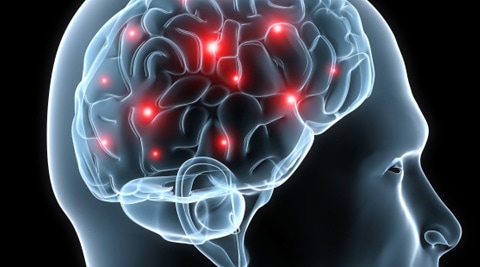Hi. We are human. We have emotions. And not everyone has control over their emotions including me. I'm going through such a phase of my life that I can't even describe. It's dramatic to describe, it's what I want but it's not going as I want it to be. Ahem, we should leave this topic here.
So, what I wanna share today is about how the mind works. Our body is perhaps a machine.
The brain communicates with itself by sending out chemical information from one neuron, or nerve cell, to another.
 |
| The Chemistry of Human Brain |
Every day, researchers are learning more about the chemicals that the neurons in the human brain use to communicate with each other. They now know that all the feelings and emotions that people experience are produced through chemical changes in the brain. The “rush” of happiness that a person feels at getting a good grade on a test, winning the lottery, or reuniting with a loved one occurs through complex chemical processes. So are emotions, such as sadness, grief, and stress. When the brain tells the body to do something, such as to sit down or run, this also sets a chemical process in motion. These “chemical communicators,” or neurotransmitters, are the “words” that make up the language of the brain and the entire nervous system.
Following are the different chemicals and how do they affect the human brain.
Serotonin
You probably already know that serotonin plays a role in sleep and in depression, but this inhibitory chemical also plays a major role in many of your body’s essential functions, including appetite, arousal, and mood. Many antidepressants target serotonin receptors to improve your mood and lessen depressive symptoms.
Interestingly, most of your serotonin is stored in the intestine, and this chemical may play a role in digestive functioning as well.
Dopamine
Dopamine controls many functions, including behavior, emotion, and cognition. This chemical also communicates with the front part of your brain, which is associated with pleasure and reward. On the positive side, it helps motivate you to work toward achieving a reward. However, many illegal drugs also target dopamine receptors, contributing to drug and alcohol addiction. Because dopamine is related to movement, low levels have also been linked to Parkinson’s disease.
Glutamate
This is the most common excitatory neurotransmitter, found throughout your brain and spinal cord. Glutamate has many essential functions, including early brain development, cognition, learning, and memory.
Norepinephrine
This chemical, also called noradrenaline, can sometimes act as a hormone as well. Its primary role is part of your body’s stress response. It works with the hormone adrenaline to create the “fight-or-flight” feeling. Norepinephrine may also be used as a drug to raise or maintain blood pressure in certain illnesses.
The End Notes
Brain chemistry is the sum of all the chemical messaging that takes place in the brain, which allows it to carry out its daily functions, such as generating movement, speaking, thinking, listening, regulating the systems of the body, and countless others. That's all in this article. I hope you liked it. If yes, please share this article with your friends. Have a good one. Cheers!


0 Comments
Please share your views.